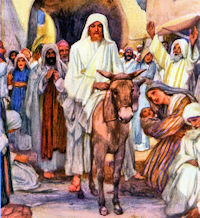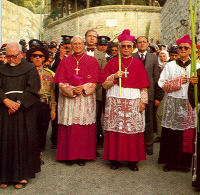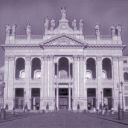Roman Rite
Holy Week
Palm and Passion Sunday- Year C- April 14th, 2019
Is 50:4-7; Ps 22; Phil 2:6-11; Lk 22:14-23:56
Ambrosian Rite
Authentic Week
Sunday of the Palms and of the Lord’s Passion
Is 52: 13-53:12 Ps 87; Heb 12:1b-3; Jn 11:55-12:11
1) To walk with Christ by sharing his passionate love
With Palm Sunday the Church lets us enter Holy Week, the week in which the Lord Jesus moves towards the fulfillment of the mission of his earthly life. The Redeemer goes to Jerusalem to fulfill the Holy Scriptures and to be hung on the cross, the wooden throne from which he will reign forever attracting the humanity of all times and offering to everyone the gift of redemption. The Gospel teaches us that Jesus had started walking towards Jerusalem with the Twelve, and that little by little a growing number of pilgrims had joined them.
What do we really do when we, pilgrims with Christ, join in such a procession and in the ranks of those who went to Jerusalem together with Jesus and acclaimed Him as the king of Israel? It is more than a moving ceremony. Does it have to do with the true reality of our life and of our world? To find the answer to these questions, we must first clarify what Jesus himself had wanted to do and done. After the profession of faith, which Peter had made at Caesarea Philippi located in the north of the Holy Land, the Messiah had set out as a pilgrim to Jerusalem for the feasts of the Passover. He is on his way to the temple in the Holy City, the place that for Israel was the assurance of the closeness of God to his people. The Redeemer is walking towards the celebration of Easter, a memorial of the liberation from Egypt and a sign of hope for the definitive liberation. He knows that a new Easter awaits him and that he will take the place of the sacrificed lambs offering himself on the Cross. He knows that, in the mysterious gifts of bread and wine, he will give himself forever to his friends and will open the door to a new way of liberation and to the communion with the living God. He is on his way to the height of the Cross, towards the moment of love that donates itself. The final term of his pilgrimage is the height of God himself to which he wants to raise the human being. Because of this, he poured his blood to the last drop.
Listening to the bloody Passion of Christ, a warrior pronounced what is one of the strongest sentences that have ever come out from a Christian mouth. While they were reading the Passion, King Clovis was sighting and crying. Suddenly, this warrior king could not take it any longer and brandishing his sword said: “If only I had had been there with my Francs!” These words of a soldier and of a violent person are the opposite of the words that Christ had said to Peter, who also had grabbed the sword and cut the ear of one of those who had come to arrest Jesus. They are naïve words, words of a soldier and of a violent non-convert but they are words that have the beauty of a pure and vigorous love.
It is not enough to cry over the One who has given us not only tears unless our cry is like the one of the Virgin who, having accepted to be pierced by the sword of pain, was able to accept the death of her Son and us as her children, and unless it is like the cry of Peter.
Let’s fight the good battle with Christ and for Christ transforming Peter’s sword (and Clovis’ one) in the Cross.
- On the Cross, Jesus, who is Life, has offered himself to death for love so that we may live forever in our Father who is in Heaven;
- With the Cross, Jesus gives us the warning of mercy “The one who doesn’t take up his cross and doesn’t follow me, doesn’t deserves me”
- Under the Cross, Jesus falls three times so that we can get up and not be dismayed
- From the Cross, Jesus is provisionally freed by the man from Cyrene so that we can see in him our neighbor and take the weight of the cross off him. At the same time, He let Veronica dry his face so that we can learn that, when we mercifully dry our neighbor’s pain, the image of the Redeemer is imprinted in us.
- Crucified on the Cross, Jesus, who cannot do anything anymore, does all: he signs the Covenant of mercy, frees us from sin and from death and leaves these words to be used as weapons in the battle of life, “Father forgive them for they know not what they do” “Woman, behold thy son. Behold thy mother” “Amen I say to you, today you will be with me in Paradise” “My God, my God, why have you abandoned me?” “I’m thirsty” “All is done” “Father, into your hands I commend my spirit”.
2) Remembrance of a tragedy
If I wanted to be more precise, I should call this paragraph the liturgical remembrance of the tragedy of one who enters Jerusalem acclaimed like a king, a few days later exits the city condemned to death but who then returns alive of an eternal life.
It is a remembrance that is also participation in the tragedy. This also happens in the Mass with the liturgy of the Word and with the Eucharistic liturgy.
Today’s liturgy offers us the narration of the Passion according to Luke. He presents it as the final phase of Jesus’ journey (Lk 9,51) that has taken him from Galilee to Jerusalem (Lk 9,31;13,32) and more precisely to the end of his life on earth and of his mission. At the same time, this final phase is the passage to glory, the resurrection. This road implies suffering and the bearing of the cross, both of which are necessities. (Lk 17,25; 24,26). This is the road that Jesus walked first as a model for all Christians. Christ’s passion is also the last, strong contrast with evil who, while stronger at first glance (Lk 22,53), in the end, will be defeated.
In the gospel according to Luke, the meaning of Christ’s death is stated with Hellenistic and not Semitic features: there is no emphasis on the atoning character of the cross but on the victory of the resurrection. The cross is linked not only to death, the place of the Son Jesus’ obedience to the Father (Lk 9,22; 13,33;17,25;22,37;24,7.26) but also of the effusion of the Spirit. Luke tells us that, with his behavior, Jesus has opened a way of salvation for humanity. Moreover, his passion is an invitation to conversion for all men and women (Saint Ambrose calls the gospel according to Luke, Gospel of Mercy). This Evangelist tells some details of the merciful passion of Jesus. Despite the suffering for the cross he is carrying, Jesus is worried for the women that follow him to the Calvary (Lk 23, 27,31), justifies to the Father the ones that are crucifying Him, asks forgiveness for them (Lk 23,34), and promises to the repentant thief a place with Him in heaven (Lk23, 43).
Luke presents Jesus who gives his spirit to the Father confidant in his unfathomable design: “He commended the spirit”. Let’s contemplate the death of Jesus from whose chest water and blood poured out, baptism and Eucharist, the sacraments of redemption. Let’s contemplate him taken down from the cross, in his mother’s womb, so that from the love of her pain she could pour over us all graces. It is like Mass. In fact, from the beginning, the Church saw in this the anticipation of what it is done in the liturgy. “For the first Church “Palm Sunday” was not a thing of the past. As the Lord had entered the Saint City astride a donkey, in the same way, the Church was seeing Him coming again and always under the humble species of bread and wine.
The Church greets the Lord in the holy Eucharistic as the one who comes now and who has come in her. At the same time, she greets Him as the one who lives always, the one who comes and prepares us for his coming. Let’s go to Him like pilgrims. He comes towards us and associates us to his “ascent” toward the Cross and the Resurrection, toward the final Jerusalem that, in communion with his Body, is already growing in this world. (Joseph Ratzinger, Jesus of Nazareth, Vol II page 24)
In the Mass we conquer what separates us from Christ, we become one body with Him, new men, and women in sanctity, and we listen to the callback to the truth of his peace and his love. Let’s welcome Christ in our hearts as did the Virgin Mother.
The consecrated Virgins are a testimony of this. They are the example of a life totally given to Christ in their love for Him and in their trust in him and in his strength.
In the Rite of Consecration are present the incense (the sign of the continuous prayer the consecrated person is called to make), the cross (the sign to be carried always as a reminder to self and to the others of the Christ’s passion) and the candle (or the lamp, the sign of devotion to Christ even when the Lord asked to participate in his passion).
Virginity in our life is not possible without sacrifice. We need to mature in us a progressive detachment from an instinctive mode of possession toward a look that loves and respects the other in his being a creature of God. In this detachment from instinct, we experience the dawn of a new life. It is the experience of the hundredfold promised by Jesus already during our earthly existence. It is essential to virginity to be a witness, “martyrdom” is a Greek word which means “witness” and which has as its root in the verb “mimnesko” which means “to remember”, that is to say, to remember Christ who has come to us and, with his passion, has showed us how great his love was. It is Passion so that Christ can also be known by others and transform their lives so that the world can be more human. Virginity is a way of life that cries out the name of Christ as the only reason and the only possibility of fullness in life. It is the summit of love, it is our response to the predilection of Christ, within which we learn to love everything else. In the De sacra virginitate Saint Augustine exhorts the virgins to contemplate the beauty of Christ (De s. Virg.,55):” Gaze on the Beauty of your Lover: think of Him equal to the Father, made subject also to His Mother: ruling even in the heavens, and serving upon the earth: creating all things, created among all things. That very thing, which in Him the proud mock at, gaze on, how fair it is”. Here he refers to the crucified Christ. He means that the Passion of Christ also has a stupendous beauty, a beauty that is certainly not external.” With inward eyes gaze on the wounds of Him hanging, the scars of Him rising again, the blood of Him dying, the price of Him that believes, the gain of Him that redeems”. This is a stupendous page of spirituality that has contemplation as its center and Christ as the object of our contemplation. This is the attitude of every Christian. In the contemplation to Christ, there is a special reason for love, just as their special reason to consider Christ as the only, full, total, and exclusive object of our joy.



 The priests and deacons wear red vestments for Mass. There is a special entrance at the beginning of each Mass, either simple or solemn. This includes a blessing of the palms and the gospel reading of the entrance into Jerusalem (Matt 21:1-11; Mark 11:1-10; John 12:12-16; Luke 19:28-40). The introduction by the priest explains the solemnity of Holy Week, and invites the faithful to take full part in the celebration:
The priests and deacons wear red vestments for Mass. There is a special entrance at the beginning of each Mass, either simple or solemn. This includes a blessing of the palms and the gospel reading of the entrance into Jerusalem (Matt 21:1-11; Mark 11:1-10; John 12:12-16; Luke 19:28-40). The introduction by the priest explains the solemnity of Holy Week, and invites the faithful to take full part in the celebration:  Palm Sunday of the Lord's Passion
Palm Sunday of the Lord's Passion

